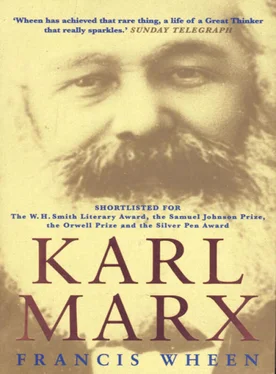Feuerbach was one of the first writers from whom Marx solicited a contribution to the Deutsche-Französische Jahrbücher as soon as he knew that its publication was assured. On 3 October 1843, just before setting off to join Ruge in Paris, he wrote to suggest a demolition job on the Prussian court philosopher F. W. von Schelling, his old antagonist from Berlin University. ‘ The entire German police is at his disposal, as I myself experienced when I was editor of the Rheinische Zeitung . That is, a censorship order can prevent anything against the holy Schelling from getting through … But just imagine Schelling exposed in Paris, before the French literary world! … I confidently expect a contribution from you in the form you may find most convenient.’ As further enticement, he added a cheeky postscript: ‘Although she does not know you, my wife sends greetings. You would not believe how many followers you have among the fair sex.’
Feuerbach was not seduced. He replied that, in his opinion, it would be rash to move from theory to practice until the theory itself had been honed to perfection. Marx, by contrast, believed the two were – or ought to be – inseparable. Praxis makes perfect, and the most necessary practice for philosophers at this time was ‘merciless criticism of all that exists’. The critique of Hegel had been inspired by Feuerbach; now Feuerbach himself, having served his purpose, must expect to be criticised in turn – most notably in the Theses on Feuerbach , written in the spring of 1845, which conclude with the most succinct summary of the difference between anchorites and activists: ‘The philosophers have only interpreted the world, in various ways; the point is to change it.’
Unlike most of the thinkers whom Marx chewed up and spat out, Feuerbach earned his lasting gratitude. ‘ I am glad to have an opportunity of assuring youof the great respect and – if I may use the word – love which I feel for you,’ he wrote to Feuerbach in 1844. ‘You have provided – I don’t know whether intentionally – a philosophical basis for socialism … The unity of man with man, which is based on the real differences between men, the concept of the human species brought down from the heaven of abstraction to the real earth, what is this but the concept of society !’
In his last weeks at Kreuznach, Marx wrote two important essays which were to appear in the Deutsche-Französische Jahrbücher . The first, ‘On the Jewish Question’, is usually mentioned only en passant , if at all, in Marxist hagiographies. But it has provided powerful ammunition for his enemies.
Was Marx a self-hating Jew? Although he never denied his Jewish origins, he never drew attention to them either – unlike his daughter Eleanor, who proudly informed a group of workers from the East End of London that she was ‘a Jewess’. In his later correspondence with Engels, he sprayed anti-Semitic insults at his enemies with savage glee: the German socialist Ferdinand Lassalle, a frequent victim, was described variously as the Yid, Wily Ephraim, Izzy and the Jewish Nigger. ‘ It is now quite plain to me– as the shape of his head and the way his hair grows also testify – that he is descended from the negroes who accompanied Moses’ flight from Egypt, unless his mother or paternal grandmother interbred with a nigger,’ Marx wrote in 1862, discussing the ever-fascinating subject of Lassalle’s ancestry. ‘Now, this blend of Jewishness and Germanness, on the one hand, and basic negroid stock, on the other, must inevitably give rise to a peculiar product. The fellow’s importunity is also niggerlike.’
Some passages from ‘On the Jewish Question’ have an equally rancid flavour if taken out of context – which they usually are.
What is the secular basis of Judaism?Practical need, self-interest.
What is the secular cult of the Jew? Haggling.
What is his secular God? Money …
We therefore recognise in Judaism the presence of a universal and contemporary anti-social element whose historical evolution – eagerly nurtured by the Jews in its harmful aspects – has arrived at its present peak, a peak at which it will inevitably disintegrate.
The emancipation of the Jews is, in the last analysis, the emancipation of mankind from Judaism.
Those critics who see this as a foretaste of Mein Kampf overlook one essential point: in spite of the clumsy phraseology and crude stereotyping, the essay was actually written as a defence of the Jews. It was a retort to Bruno Bauer, who had argued that Jews should not be granted full civic rights and freedoms unless they were baptised as Christians. Although (or perhaps because) Bauer was an ostentatious atheist, he thought Christianity a more advanced phase of civilisation than Judaism, and therefore one step closer to the joyful deliverance which would follow the inevitable destruction of all religion – just as a gravedigger might regard a doddery dowager as a more promising potential customer than the local Queen of the May.
This perverse justification for official bigotry, which allied Bauer with the most reactionary boobies in Prussia, was demolished with characteristic brutality. True, Marx seemed to accept the caricature of Jews as inveterate moneylenders – but then so did almost everyone else. (The German word ‘ Judentum ’ was commonly used at the time as a synonym for ‘commerce’.) More significantly, he didn’t blame or accuse them: if they were forbidden to participate in political institutions, was it any wonder that they exercised the one power permitted to them, that of making money? Cash and religion both estranged humanity from itself, and so ‘the emancipation of the Jews is, in the last analysis, the emancipation of mankind from Judaism’.
From Judaism, nota bene , not from the Jews. Ultimately, mankind must be freed from the tyranny of all religions, Christianity included, but in the meantime it was absurd and cruel to deny Jews the same status as any other citizen. Marx’s commitment to equal rights is confirmed by a letter he sent from Cologne in March 1843 to Arnold Ruge: ‘I have just been visited by the chief of the Jewish community here, who has asked me for a petition for the Jews to the Provincial Assembly, and I am willing to do it. However much I dislike the Jewish faith, Bauer’s view seems to me too abstract. The thing is to make as many breaches as possible in the Christian state and to smuggle in as much as we can of what is rational.’ It is also borne out by the other major work on which he started during the post-honeymoon summer of 1843, ‘Towards a Critique of Hegel’s Philosophy of Right : An Introduction’, which was completed in Paris a few months later and published in the spring of 1844.
Though its title may be familiar only to the initiated, the essay itself is as famous as the article on Judaism is obscure. Many of those who have never read a word of Marx still quote the epigram about religion being the opium of the people. It is one of his most potent metaphors – inspired, one guesses, by the ‘Opium War’ between the British and Chinese, fought from 1839 to 1842. But do those who parrot the words actually understand them? Thanks to his self-appointed interpreters in the Soviet Union, who hijacked the phrase to justify their persecution of old believers, it is usually taken to mean that religion is a drug dispensed by wicked rulers to keep the masses in a state of dopey, bubble-brained quiescence.
Marx’s point was rather more subtle and sympathetic. Though he insisted that ‘the criticism of religion is the prerequisite of all criticism’, he understood the spiritual impulse. The poor and wretched who expect no joy in this world may well choose to console themselves with the promise of a better life in the next; and if the state cannot hear their cries and supplications, why not appeal to an even mightier authority who promised that no prayer would go unanswered? Religion was a justification for oppression – but also a refuge from it. ‘ Religious suffering is at one and the same timethe expression of real suffering and a protest against real suffering. Religion is the sigh of the oppressed creature, the heart of a heartless world and the soul of soulless conditions. It is the opium of the people.’
Читать дальше












